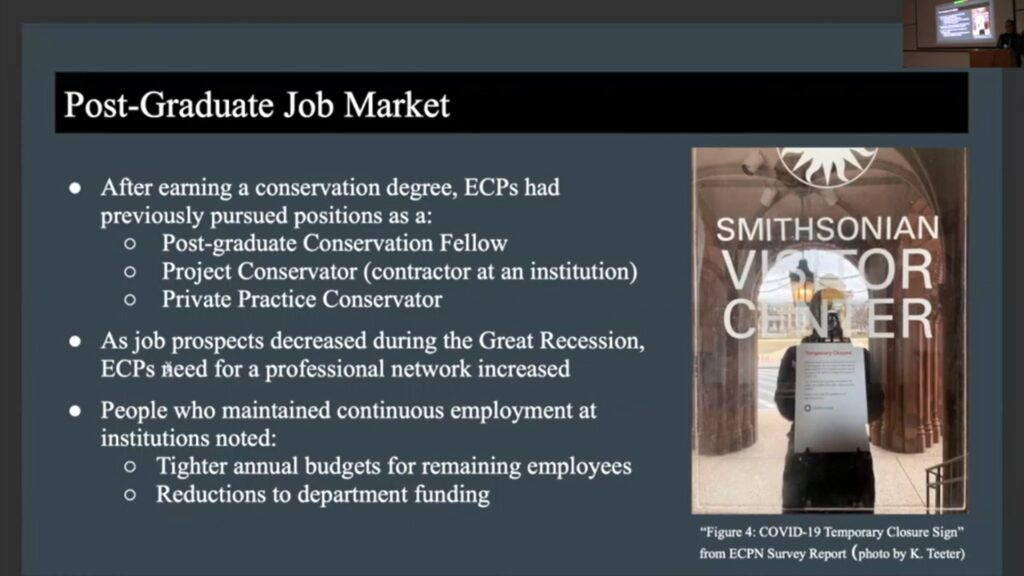Ring 3: MAKING CONNECTIONS
“ECPN Retrospective of the Great Recession: Survey Report”
Presented by former ECPN Professional Education and Training Officers Keara Teeter & Annabelle Camp
Summarized by Evelyn Bird, Emerging Conservation Professional
From 2020–2021 Emerging Conservation Professionals Network (ECPN) Professional Education and Training (PET) Officers compiled a multi-part outreach series in response to the COVID-19 pandemic. The 2020 ECPN survey was intended to be answered by conservation program alumni from the classes of 2007–2014.
Most of the conservation alumni were mid-career when taking the survey, and they came from a pool of 66 people. The survey prompted 32 questions, with 85.7% of conservators identifying as female and 85.7% identifying as white. Of the conservators who took the survey, 40 people (60.6% of survey participants) lived in the Mid-Atlantic region during their time as emerging professionals.

An opening question from the survey was “Which year did you earn your conservation degree?” With 39% earning their degree between 2007–2009, and 66% earning their degree between 2007-2014. The participants also stated that the time of the Great Recession was especially hard for those that were Pre-Program, due to the reduction of job and internship opportunities. Pre-Program or Emerging Conservation Professionals at the time felt that the application process was even more competitive when applying to graduate programs.
After earning one’s conservation degree, Emerging Conservation Professionals (ECPs) had previously pursued positions such as Post-Graduate Conservation Fellowships, Project Conservator/Contract positions, and Private Practice Conservation work. However, as job prospects decreased during the Great Recession, the need for professional networking increased. Many ECPs entered into the private conservation sector, either by starting a private practice themselves, or sub-contracting with an already established practice. However, ECPs that did not enter private practice cited reasons such as: feeling unprepared, physical location (lack of space to work), high startup costs, difficulty establishing a client base, and difficulty facing stigma.
Those who maintained continuous employment at institutions noticed tighter annual budgets with a decrease in contract and permanent positions. Because the Great Recession brought about major financial implications and hardships for many ECPs, many accrued credit-card debt and had to take out financial loans. The lack of health coverage offered for many contract positions led to even more concerns about stability. During this time, approximately 60.7% of survey participants received financial assistance from a parent, partner/spouse, or other personal relationship.
For those who had to seek employment outside of conservation, many ECPs also considered leaving the field entirely; although the survey did not illustrate that permanent departure from the field was solely correlated with the Great Recession. Luck and timing may have helped some progress in the field, others felt that without positive support from mentors and family, they felt more discouraged to continue to pursue a career in conservation. There are many parallels from the Great Recession of 2007–2009 to the current COVID-19 Pandemic when considering stability in conservation, and everyone’s experience was and is unique. Networking and patience seem to be the most enduring buzzwords from the advice issued by many long-standing professionals in the effort to overcome past and current difficult times and to find a career path in conservation.
A recording of this presentation is available on WCG’s YouTube Account.
Online Resources
ECPN Retrospective of the Great Recession: Survey Report (2021 blog)
ECPN Fellowship and Internship Compensation Spreadsheets
Knowledge is Power; take-aways from the ECPN 2018 Compensation Survey (2021 poster)
Making the Ask: Developing Negotiation Tactics in the Field of Conservation (2020 workshop)